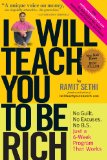Review: I Will Teach You To Be Rich #
(Photo: Amazon)
Review #
Ramit Sethi (that I guy I quote a lot), author of the website IWillTeachYouToBeRich.com, published a book by the same name about personal finance for twentysomethings.
Although I knew the book would not differ much from the content available on his website, it was pleasant to have Ramit's thoughts presented in close proximity to each other rather than spread out across the years I've been following his blog.
Most of his advice revolves around a single theme: stop loosing money by doing nothing. It occurred to me that while in the world of economics, such appeals to opportunity cost are customary, the world of twentysomethings would much rather feel guilty about doing nothing rather than actually figuring out what needs to be done and doing it. (Please pardon the gross oversimplifications; there are many responsible twenty year-olds, but few who think they can do anything about their finances.)
The blog contains much, if not all, of the advice in the book, but the book highlighted three things I had failed to implement (though I read them on the blog). First, I finally took Ramit's advice about negotiation, and negotiated a bill. I clearly have more work to do in that department, but it was good to have a plan of how to approach the conversation, and not feel weird about talking about money. To Ramit's credit, he portrays negotiation as asymmetric warfare: you, a novice in negotiation, are battling with experts who negotiate with people every day. However, you needn't become a Spartan to negotiate effectively. In fact, being pleasant (and smiling) makes it even easier. Negotiation is a fascinating phenomenon in the world of human interaction; it has elements of conflict, optimization and compromise. Each party seeks to optimize results that favor him or her, yet done right both parties can win. A critical part of Ramit's advise is to avoid yes-or-no questions when you really want to ask "how can we make this work?" That one question saved me $180 (over six months) for 2 minutes worth of effort.
The next piece of advise I had failed to implement was to synchronize your bills with your paycheck (to the extent possible). The idea is to have a more predictable and automated flow of money. While I've got much of the flow nailed down, I never thought to change the billing date to a common date; we'll see how this works out over the coming months and years.
Lastly, the book provided a clearer perspective on what it takes to buy a house. Again, this isn't anything that Ramit hadn't said previously about buying a house. It was just easier to focus on his points when I was reading a book (about finance!) rather than reading my daily blogs. The only change in behavior this created was creating a little "dashboard" for important goals. Previously the goals were general (house, travel, etc.); now they are very specific (20% down payment, trip to California, etc.). This small change forced me to also estimate the cost and, by extension, the date of fulfillment of each of the goals. Again, the payoff is mostly psychological, but it helps take down some psychological barriers.
Overall, I recommend this book to most people as an example of how to set up an automatic system that helps alleviate certain kinds of stress. It's an excellent short read and his good humored presentation doesn't hurt either.
Updates #
2023-11-28 #
- Updated broken links.
